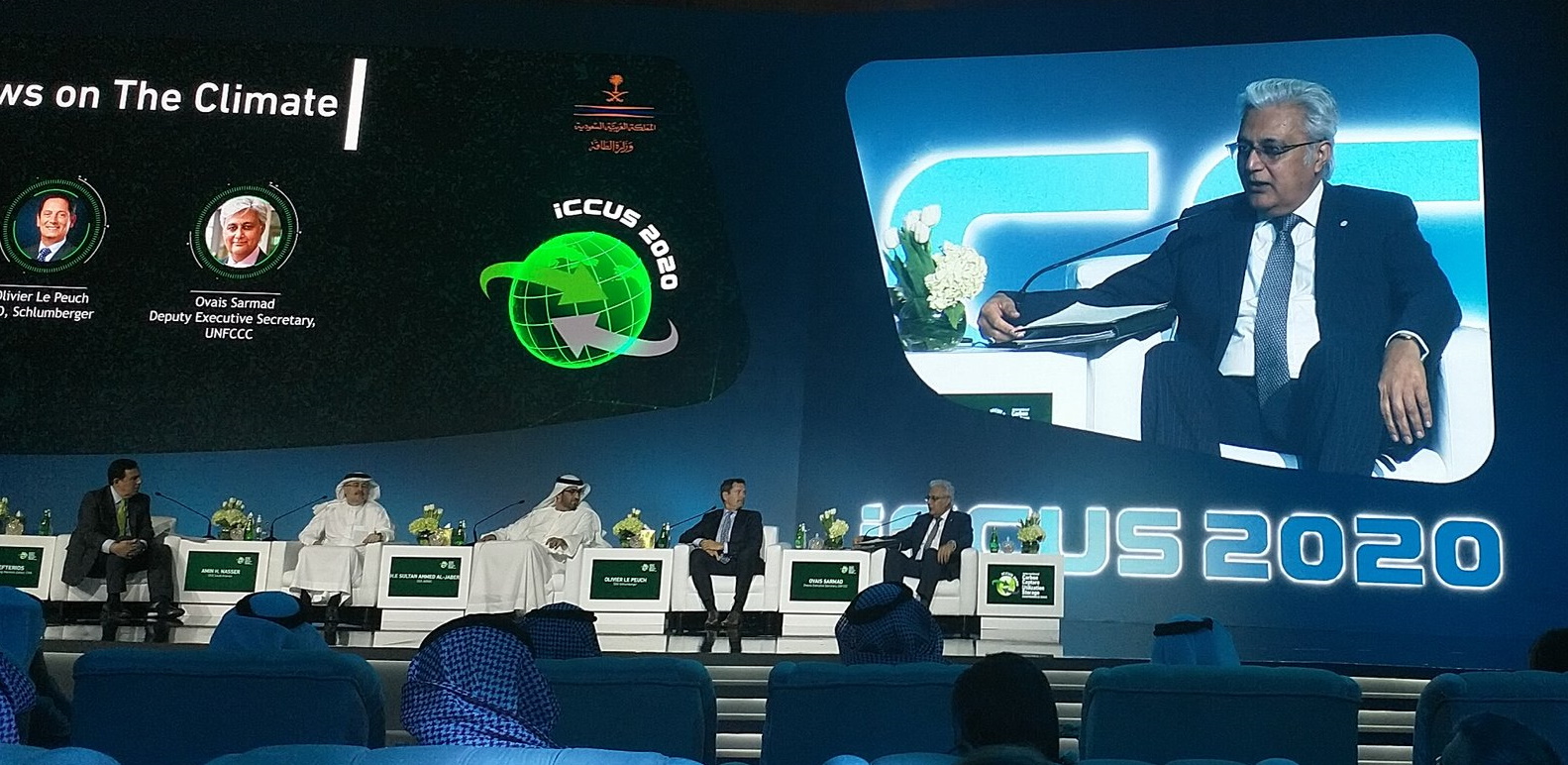
I was honoured to be representing the International CCS Knowledge Centre (Knowledge Centre) in Riyadh, Saudi Arabia, at the International Carbon Capture, Utilization, and Storage (iCCUS 2020) conference in February. The purpose of the conference was to address multiple dimensions of the Circular Carbon Economy (CCE) as well as how Carbon Capture Utilization and Storage (CCUS/CCS) technology – through the removal, reuse, and recycling of CO2 emissions – is a key enabler of the CCE.
CCUS technology continues to demonstrate its proven track record to deliver substantial emissions reductions in the power and industry sectors. Although we are seeing CCUS consistently featured in models for achieving Paris Agreement climate targets, the rate of deployment is still not where it needs to be. There are currently 18 large-scale CCUS plants in operation across the globe; capturing and storing approximately 30Mt of CO2 annually (GCCSI, 2017), and according to the International Energy Association (IEA), the world needs to increase that to around 1,000Mt of CO2 annually by 2030.
The conference was a jam-packed two-day event, complete with an unforgettable gala featuring local cuisine, wandering live music, and stunning entertainment consisting of sword-dancing, falcons, and a sandstorm. Below is just a sample of what happened over the two days.
Emitters & Environmental Leaders Agree CCUS is Needed
Global oil industry and development giants, alongside environmental authorities, discussed the common need for scaled deployment of CCS. The CEOs of Saudi Aramco (Amin H. Nasser), ADNOC (H.E. Sultan Al Jaber), Schlumberger (Olivier Le Peuch), along with the Deputy Executive Secretary of UNFCCC (Ovias Sarmad), shared thoughtful and frank perspectives on how to address deep emissions reductions across value chains and the economy. In fact, Saudi Aramco has major investments in procuring subsurface control devices related to storage of captured CO2 in the Enhanced Oil Recovery (EOR) process. ADNOC is also investing in enhanced capabilities, bringing in a wealth of data and field information from its plants equipped with Artificial Intelligence (AI), where CCS will be a central part of some operations. They tout that these AI plants can be successful through increasing capture rates from sour gas by as much as 500 per cent. As a world-leading oil services giant, Schlumberger also has decades of data regarding advancements in ethanol bioenergy upstream and midstream, which includes methane.

Balancing the need for climate action with responsibilities to energy security is a well-known challenge in industry and is paramount to Sustainable Development Goals. As the go-to global climate convener and information body, the UNFCCC has a key role to play in connecting such information and expertise with policy and governments – establishing the level of certainty needed to see investments in innovation, which can act to signal that next generation deployment can be less costly and more efficient. Inclusive solutions and strong multinational efforts are also needed to see everyone doing their part; ensuring climate action efforts, along with the transition to a new energy economy, is just and well thought-out, for all businesses.
OPEC Calls for Urgent Multinational Action
The Secretary General of the Organization of the Petroleum Exporting Countries (OPEC), H.E. Mohammed Sanusi Barkindo reinforced findings from the Intergovernmental Panel on Climate Change (IPCC) Special Report on 1.5C in his keynote address, stressing that CCS is a proven technology that is a necessity, not an option, for reaching global climate goals. Mr. Barkindo also identified the CCE model as a holistic approach that encompasses both the willingness to share experiences with CCS and a progressive agenda for the critical role of CCS as an ecosystem when dealing with a circular economy program. He cited the importance of constructing shared infrastructure and implementing CCUS collectively to realize its full potential in decarbonization, as well as re-carbonization. It was encouraging to hear that OPEC recognizes the urgency of the banking community to put CCS front and centre of decarbonization efforts, and for policy measures to especially address a tested and proven technology, like CCS. This is a message we agree with, at the Knowledge Centre, and have been hearing more frequently as commitments for net-zero roll out. Support for a multinational CCUS process is key, where countries can put aside differences, kick-start efforts to tackle barriers, and invest in opportunities – Barkindo believes that this is the only viable framework to ensure there is collective action to address large-scale emissions.

Emerging Business Models
I was pleased to have the opportunity to chair a panel on ‘CCUS Emerging Business Models,’ comprised of representatives from the Oil and Gas Climate Initiative Climate Investments (OGCI-CI) (Michael Ryan), Columbia University (Dr. Julio Friedmann), and Northern Lights CCS (Kjetil Wilhelmsen). This panel focused on how business models, government support, joint ventures, and leveraging shared infrastructure, can all drive CCS while reducing costs and risks of investment. Panelists opined on the degree to which industry and government should be responsible for driving the R&D, various business case opportunities, and funding for large-scale deployment of CCUS. They also covered the topics of carbon pricing, and investment in shared infrastructure projects (particularly industrial hubs), for reducing investment cost and risk.
With this panel, the key takeaways to note, were:
- Government financing is important for R&D, but CCUS still requires government support to rapidly scale deployment at the necessary level. Like any technology, the more CCUS is deployed commercially, the more the costs will come down; making it quicker to scale.
- Government incentives, like 45Q, can be another form of incentive to drive projects.
- The value of carbon, and a price on carbon, can drive deployment.
- Enhanced Oil Recovery (EOR) projects are highly desirable business case models due to their cost recovery through CO2 sales, but are not the only option. The CO2 market for storage can act to drive business cases, as is the case with the Northern Lights project.
- Earlier projects can complement the development of industrial hubs, as we are seeing with OGCI-CI’s investment in Wabash Valley Resources’ Ammonia CCS fertilizer plant, and the newly announced Elk Hills Power CCS Project for Natural Gas in California (announced on our panel).
- Industrial hubs with shared infrastructure are an emerging trend that have the potential to support emission reductions across an energy system, including linkages with hydrogen production, power generation, industry, as well as measures to facilitate investment.

Accelerating CCS Deployment
In a panel chaired by Saudi Aramco (Omar Abdulhamid) showcasing ’Lessons from Large-Scale Demonstration Projects,’ we had the opportunity to touch on the key learnings from the pioneering Boundary Dam CCS Facility (BD3) and our gathered knowledge since that facility launched five years ago. We had engaged discussions on the panel alongside JX Nippon Oil & Gas Corporation (Takeo Tanei), Abu Dhabi National Oil Company (ADNOC) (Khadija Al Daghar), and Saudi Aramco (Ashraf Tahini), around best practices for advancing demonstration projects to large-scale operations; including the role of business cases for both commercialization and accelerating deployment through cooperation and knowledge sharing.
The Knowledge Centre took a call to action, stating that while we need research and development (R&D) projects, we currently have the ability to deploy large scale CCS technology, and given the global urgency to increase CCS, we should not sacrifice that deployment waiting for the next thing. We need every solution at our disposal, and while that will develop with time, based on our collective knowledge, we don’t always have to start from square one to conduct testing and pilots for every new market. Our chair, Mr. Abdulhamid, supported the notion of urgent accelerated deployment and suggested collective action through formal global measures.
It was important to see the leadership role a global energy giant like Saudi Arabia is taking to reshape the future of energy policy. Discussing the interlinkages between energy and climate in government policy making is important for fostering an inclusive and holistic approach to addressing the climate challenge. There are so many opportunities for knowledge sharing across industry and government that will only bring us closer to accelerating deployment of CCUS.

